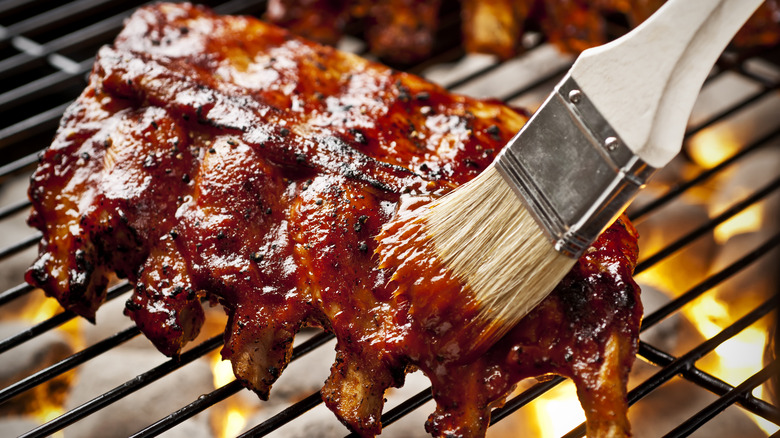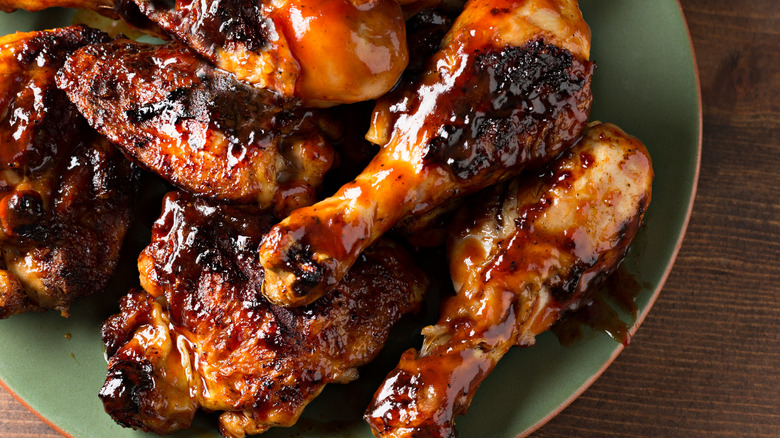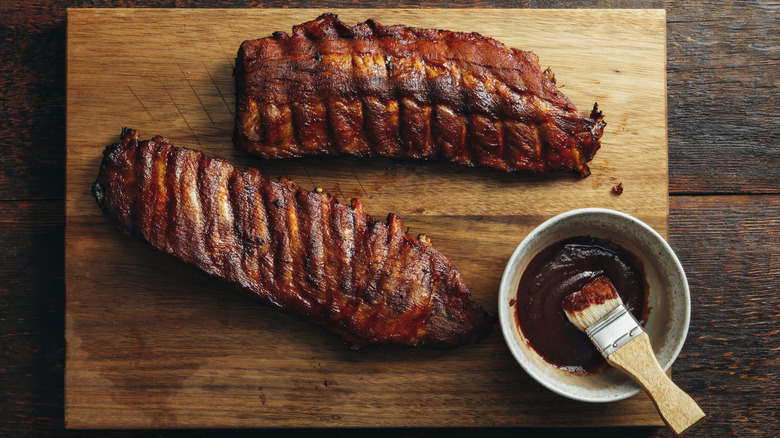The Reason BBQ Sauce Should Never Be Added To Meat Too Early
There are tons of varieties of barbecue sauce, from vinegary Carolina sauces to the creamy white condiment from Alabama. But the most prolific version of the sauce (at least in the United States) might be Kansas City-style BBQ sauce, a sweet and smoky glaze that goes well with pretty much any type of meat, from pork to chicken.
While it's easy to just open up a bottle of store-bought barbecue sauce (or whip up homemade barbecue sauce) and start basting, stop short before using that sauce too early. Some people slather their sauce on before sticking their meat in the oven or on the grill and are then shocked to see their food thoroughly scorched before the meat even comes up to temp. There's a simple way to avoid this — don't sauce your food until it's almost fully cooked, then hit it with your favorite sauce right before finishing it.
The early sauce gets the burn
What causes barbecue sauce to burn when applied too early? It all has to do with sugar. Many barbecue sauces, especially Kansas City-style sauces, are high in sugar and made with sweet ingredients, such as molasses and ketchup. A sugary sauce like this caramelizes at a fairly low temperature — around 320 degrees Fahrenheit. By the time the sauce reaches an average oven's temperature, it'll already be smoking and burning and causing a mess.
Additionally, the meat will still be raw internally by the time the exterior sauce has scorched to a crisp, leaving you with something inedible (and possibly a noisy smoke alarm as well). When you see recipes that suggest putting the sauce on early (or worse, marinate the meat in the sauce), take into consideration how you'll be cooking the meat and proceed from there.
If you're smoking the meat, which occurs at a low temperature over a long period of time, there's not much to worry about by way of burning; the temperature won't usually hit that scorch point. Grilling happens at a much higher heat, however. When grilling meat, avoid putting on sauce until the final 10-20 minutes of cooking.
Don't be late to the party
With all that worry about applying the sauce too early, why not just wait until the food comes off the grill or out of the oven to douse it? That's not the answer, either — if you want flavorful barbecue, it's still important to get the sauce on the meat while the heat's on. Saucing after cooking means that the condiment just sits on top of your meal instead of soaking in and getting cooked into the crevices. And nobody wants a lackluster picnic plate.
Cooking with a rub instead of sauce? You'll still need to be careful and monitor your heat and sugar content. Dry rubs are simply a mix of dry spices and herbs rubbed into the meat before cooking; wet rubs are much the same, but with the addition of wet ingredients, including oil and lime juice. Rubs take best to low-and-slow cooking, much like sugary sauces. So whichever way you decide to season your next barbecue venture, be aware.


